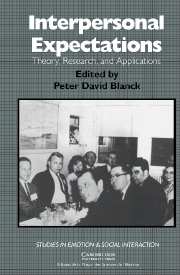Book contents
- Frontmatter
- Contents
- Preface
- List of contributors
- Introduction
- Part I Research on interpersonal expectations
- 3 Introduction to research on interpersonal expectations
- 4 Interpersonal expectations in the courtroom: Studying judges' and juries' behavior
- 5 Expectancies and the perpetuation of racial inequity
- 6 Pygmalion - 25 years after interpersonal expectations in the classroom
- 7 Interpersonal expectations in organizations
- 8 Interpersonal expectations and the maintenance of health
- 9 Precursors of interpersonal expectations: The vocal and physical attractiveness stereotypes
- 10 In search of a social fact: A commentary on the study of interpersonal expectations
- Part II Research on the mediation of interpersonal expectations through nonverbal behavior
- Part III The study of interpersonal expectations
- Author index
- Subject index
- Studies in Emotion and Social Interaction
8 - Interpersonal expectations and the maintenance of health
from Part I - Research on interpersonal expectations
Published online by Cambridge University Press: 23 December 2009
- Frontmatter
- Contents
- Preface
- List of contributors
- Introduction
- Part I Research on interpersonal expectations
- 3 Introduction to research on interpersonal expectations
- 4 Interpersonal expectations in the courtroom: Studying judges' and juries' behavior
- 5 Expectancies and the perpetuation of racial inequity
- 6 Pygmalion - 25 years after interpersonal expectations in the classroom
- 7 Interpersonal expectations in organizations
- 8 Interpersonal expectations and the maintenance of health
- 9 Precursors of interpersonal expectations: The vocal and physical attractiveness stereotypes
- 10 In search of a social fact: A commentary on the study of interpersonal expectations
- Part II Research on the mediation of interpersonal expectations through nonverbal behavior
- Part III The study of interpersonal expectations
- Author index
- Subject index
- Studies in Emotion and Social Interaction
Summary
It is a wise experimenter who knows his artifact from his main effect; and wiser still is the researcher who realizes that today's artifact may be tomorrow's independent variable.
(McGuire, 1969, p. 13)Faith healing, self-healing, and related phenomena of the mind's effects on the body present some of the most fascinating puzzles of philosophy, psychology, and medicine. The role of healer or doctor is one of the oldest and noblest, appearing prominently in civilizations throughout recorded history. Yet speculation about the distinction (or lack thereof) between healer and quack has an equally prominent history. It is only during the past century that physicians have had available some scientifically proven treatments for some specific diseases. Most healing in the past relied on successful social influence, quacks and health fraud notwithstanding. And, I will argue, so does much healing today.
A physician who “cures” three very ill patients of the flu by prescribing a new drug is almost sure to believe in the drug's efficacy. The physician thus makes two major errors of inference. First, there is no control group; there is no way to know whether the patients would have recovered without treatment by this drug. Second, the numbers are probably too small to allow reliable inference; in a different set of patients, different results might occur (Kahneman, Slovic, & Tversky, 1982). In brief, this is the problem of distinguishing the artifact from the main effect. Although it appears obvious when presented to experienced scientists, it will trip up more than half a class of medical or psychology students. It will also often trap the individual practitioner. The faulty inference results in the use of many worthless drugs and procedures for many years.
- Type
- Chapter
- Information
- Interpersonal ExpectationsTheory, Research and Applications, pp. 179 - 193Publisher: Cambridge University PressPrint publication year: 1993
- 1
- Cited by



